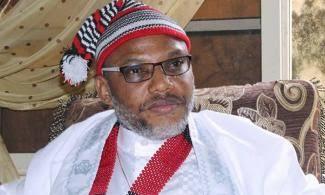
The family has been granted a court review to appeal that refusal, claiming that it has resulted in no action being taken to assist him.
The family of the leader of the Indigenous People of Biafra (IPOB), Nnamdi Kanu has been granted an order by the UK court to challenge the British government for their non-intervention in his ongoing case against the Nigerian government.
Nnamdi Kanu, a famous separatist movement outlawed in Nigeria, was apprehended in Kenya in June before being taken against his will to Nigeria, where he has been held in detention since.
The UN working group on arbitrary detention issued a statement in July stating that the father of two had been subjected to extraordinary rendition and that he should be released immediately. However, before becoming Prime Minister, two UK foreign secretary, first Dominic Raab and then Liz Truss, declined to comment on whether Kanu was a victim of extraordinary rendition.
The family has been granted a court review to appeal that refusal, claiming that it has resulted in no action being taken to assist him, The Guardian UK reports.
“The British government is well known for its stance on human rights. I believe it must be decisive when it comes to its decision-making about very serious violations of the human rights of British citizens abroad, especially when the facts are clear, as they are in my brother’s case, and when the UN has investigated and reached a firm conclusion that my brother was subject to extraordinary rendition. I am very happy that the court has agreed that a hearing is necessary to decide this important issue,” his brother, Kingsley Kanu, said.
According to Kanu's family, he was tortured in Kenya before being renditioned to Nigeria by Muhammadu Buhari's regime.
Kanu is currently being held in solitary confinement by the secret police, Department of State Services (DSS) in Abuja. The matter was forwarded to the special rapporteur on torture by the UN working group. The Nelson Mandela rules, which are international non-binding standards, forbid solitary confinement for longer than 15 consecutive days. It also voiced worry that he had been denied medical attention and medication for his heart condition.
The Nigerian government denied mistreating or torturing Nnamdi Kanu in a court document related to a separate complaint that he had filed in Abuja. It stated that because he had previously jumped bail in Nigeria, he entered Kenya illegally and was therefore not entitled to an extradition hearing.
In 2015, after establishing a digital radio station called Radio Biafra at his home in London, Kanu was detained in Nigeria and accused of inciting terrorism and terrorism-related offences.
After an attack on his family home two years later, in which he said 28 members of IOPB were slain, he departed the country while out on bail. He entered a not guilty plea to the allegations of terrorism in January.
Shirin Marker, from Bindmans LLP, who is representing Kingsley Kanu, said it was essential for the new foreign secretary, James Cleverly, to reach a firm conclusion on whether her client’s brother had been the victim of extraordinary rendition in order to decide what steps to take to assist him.
“The evidence available to date establishes that he has been subject to extraordinary rendition and torture or inhumane treatment,” she said. “It is unacceptable for the UK government to continue to prevaricate on this issue. We are glad that the court has now granted permission for this case to move to a final hearing.”
Mrs Justice Ellenbogen explained her decision to grant a judicial review hearing, saying, "Such decisions/inaction are, in theory, reviewable and do not enter forbidden realms, especially those affecting foreign policy."
While the procedures were ongoing, the Foreign Office declined to comment.